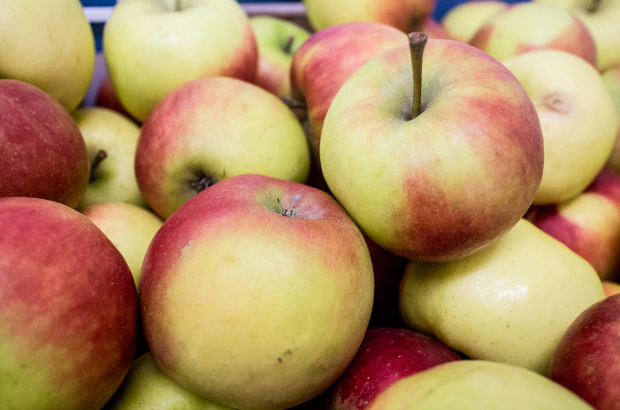- Daily & Weekly newsletters
- Buy & download The Bulletin
- Comment on our articles
Many Belgians not eating their 'five a day', study shows
Whether you are young or old, it is impossible to have missed this advice: "For good health, eat at least five fruits and vegetables a day." However, Belgians – along with many other Europeans – are still some way from achieving this daily target.
Almost one in five Belgians do not eat any fruit or vegetables on a daily basis, but they are not the worst offenders, according to a recently published figures from Eurostat, the European Statistical Office.
Only 12.4% of Europeans say they eat five or more servings of fruit and vegetables a day according to the Eurostat report which is based on figures from 2019.
Almost one in three Europeans (32.9%) do not eat fruit or vegetables on a daily basis. For the majority (55%), the average consumption is between one and four servings.
Belgium, for its part, performs reasonably well. Just over 67% of Belgians say they consume between one and four servings of fruit and vegetables each day. 15% of Belgians eat an average of five or more servings per day. The proportion of Belgians who do not consume any fruit or vegetables on a daily basis is 17.4%.
When comparing the daily consumption of five or more servings of fruits and vegetables, Belgium occupies sixth place in the ranking with 15% of its population consuming the recommended values.
The top four places are occupied by Ireland (33%), the Netherlands (30%), Denmark (23%) and France (20%). The worst performers are Austria (6%), Bulgaria (5%), Slovenia (5%) and Romania (2%).
Consuming five or more servings of fruits and vegetables daily has many health benefits. "Fruits and vegetables are important sources of water, minerals, vitamins and fibre," notes Liège dietician Danielle Mauhin.
The recommended intake for a healthy lifestyle is about 500g of fruits and vegetables per day. "One serving is about 100 to 125g and the ideal is to consume two servings of fruits and three servings of vegetables," says the dietician. "The distribution in favour of vegetables is explained by the fact that they are less sweet. Vegetables contain on average 5% sugar compared to 12% for fruits."
"The lack of fruits and vegetables can bring vitamin and mineral deficiencies but is not extremely dangerous in itself,” adds Brussels dietician Aurore Van Der Wilt. “Nevertheless, people who consume fewer fruits and vegetables tend to replace them with other sweeter, fattier foods and it is the excess of these foods that can create problems such as heart disease for example."
Another deficiency to note is that of antioxidants, as Danielle Mauhin notes: "Antioxidants protect against cellular aging. If you lack them, it can be felt in your body and the aging of it. The more colours of fruits and vegetables you have, the more antioxidants they contain. So, we can only advise to eat a plate as colourful as possible."
Despite still falling short of the recommended mark, fruit and vegetable consumption actually increased slightly in Belgium between 2014 and 2019, according to Eurostat.
In 2014, 12.6% of Belgians consumed five or more fruits and vegetables per day. This figure increased in 2019 to 15.1% of the population, an increase of nearly 20%. Belgians who did not consume fruit or vegetables regularly were 16.1% in 2014. In 2019, they were 17.4%, a slighter increase of 8%.
Belgians who did not consume fruit or vegetables regularly were 16.1% in 2014. In 2019, they were 17.4%, a slighter increase of 8%.
Another finding is that women eat more fruits and vegetables on average than men.
In Europe, 58% of women eat between one and four servings a day, while the share of men reaches 51%. The same goes for a daily consumption of five or more servings (15% vs. 10%).
The survey also showed that men were more likely than women to report not consuming fruits and vegetables at all (39% versus 27%).
The same phenomenon is visible in Belgium. 18.2% of women say they consume five or more fruits and vegetables daily, compared to 11.8% of men.
Conversely, 21.2% of men do not eat fruits or vegetables every day, compared to only 13.9% of women.
Finally, the number of men and women consuming between one and four servings is quite similar with 66.9% of men and 68% of women.
The effects on diet of the restrictions on life related to the coronavirus pandemic are not yet known. The figures transmitted by Eurostat date from 2019 and therefore do not take into account the possible effects of lockdowns caused by the health crisis.
It is therefore possible that some variations will appear in future figures even if, for Aurore Van Der Wilt, the consequences are not expected to be considerable.
"During the pandemic, some have moved towards 'comfort' food and have somewhat abandoned fruits and vegetables,” she says. “But, conversely, some have regained the taste of cooking and have started to prepare healthier dishes again."














